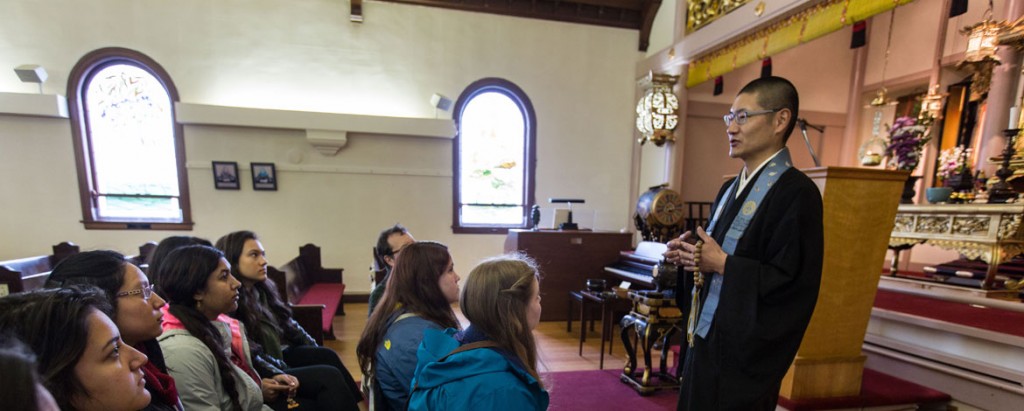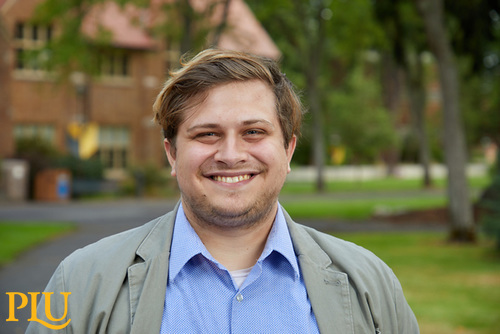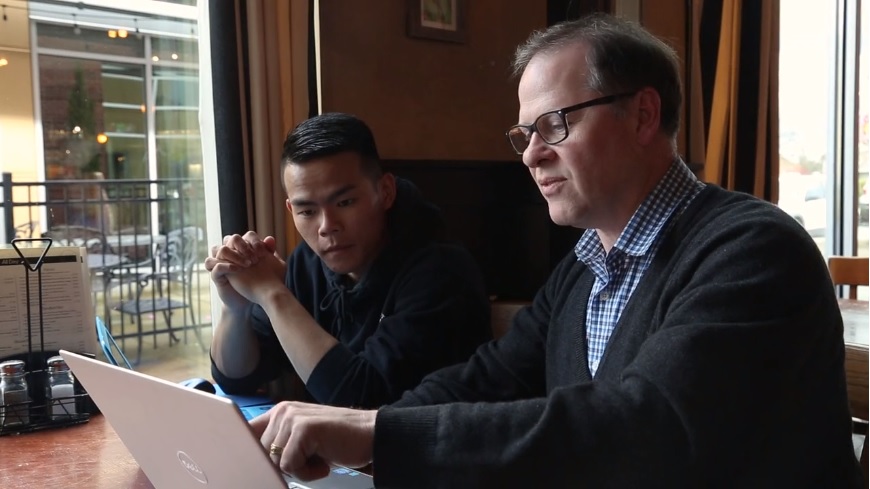Page 49 • (2,146 results in 0.045 seconds)
-
August is Women in Translation (WIT) Month; a time to highlight some of the incredible translated writings by women from around the globe. Only 30% of women who write and publish in languages other than English are translated in the U.S. and only 36% of…
Memories of a Pure Spring by Duong Thu Huong, translated by Nina McPherson and Phan Huy Duong Read Previous Interlibrary Loan Service Upgrade: Farewell ILLIAD, Hello Tipasa! Read Next On Exhibit: LGBTQ+ Authors and their Works LATEST POSTS Black History Month: Black Art Matters Exhibit January 31, 2023 Black History Month: Seeking (a Supreme Court) Justice February 2, 2022 Mortvedt Library materials for HEALING: PATHWAYS FOR RESTORATION AND RENEWAL symposium February 16, 2022 On Exhibit: Women’s
-

TACOMA, WASH. (April 25, 2016)- Erik Hammerstrom, assistant professor of East Asian and comparative religions, teaches Pacific Lutheran University students the fundamentals of Buddhism from the shores of Honolulu, Hawaii, to the streets of Chengdu, China. Now, the course has arrived in a more familiar…
shores of Honolulu, Hawaii, to the streets of Chengdu, China. Now, the course has arrived in a more familiar locale.Utilizing Tacoma’s diverse and complicated history, Hammerstrom and 23 students have the opportunity to learn firsthand about Tacoma’s Buddhism. The upper-division global religion course is split between on-campus lecture and discussion and off-campus site visits. Most recently, students visited the Tacoma Buddhist Temple and a Korean zen temple, both within a 20-minute drive of campus
-

Records Services Specialist | Office Of The Registrar | stagerja@plu.edu | 253-535-8347
Jayson Stager Records Services Specialist Phone: 253-535-8347 Email: stagerja@plu.edu Professional Education B.A., Anthropology/History, Pacific Lutheran University Responsibilities Major/Minor Declarations – University Withdrawals – Course Withdrawals – Grade Changes – Non-Matriculated Registration – Incomplete Grades
-
12 semester hours in one of the following six work sectors A. Education 12 semester hours from one of the following areas Biology Chemistry Computer Science Education English Geosciences Math
Natural Resources GEOS 332: Geomorphology HIST 370: Environmental History of the U.S. PHIL 226: Environmental Ethics PHIL 327: Environmental Philosophy POLS 346: Environmental Politics and Policy RELI 239: Environment and Culture RELI 365: Climate Justice RELI 393: Topics in Comparative Religions (when topic is “Native Traditions in PNW” only) Geosciences GEOS 103: Earthquakes, Volcanoes, and Geologic Hazards GEOS 201: Geologic Principles Native American and Indigenous Studies NAIS 244: Environmental
-

By Michael Halvorson, ’85 This week is Computer Science Education Week (Dec. 3-Dec. 9) in the United States. I helped celebrate on Monday at the Paul G. Allen School of Computer Science at the University of Washington in Seattle. The event was sponsored by Code.org…
phenomenon with an important social impact. Social innovation At PLU, we’ve been studying social innovation all year in our new Innovation Studies program. As part of our work, we invited Alice Steinglass to share her organization’s strategy during this year’s Benson Lecture in Business and Economic History. Steinglass participated in a workshop on teaching computer science in local schools (with Heavenly Cole and Laurie Murphy), and she delivered an exciting evening talk for about 180-students, faculty
-
Embracing the past to learn about the future To understand the future there is a need to understand the past. Angie Hambrick, director of the Pacific Lutheran University Diversity Center, said too many people have forgotten the past.“We’re so wrapped up in our present,” she…
March 14, 2011 Embracing the past to learn about the future To understand the future there is a need to understand the past. Angie Hambrick, director of the Pacific Lutheran University Diversity Center, said too many people have forgotten the past.“We’re so wrapped up in our present,” she said. “There’s a connection between the past and what’s happening in the present. You can’t forget about history.” Hambrick said it is the lack of historical knowledge that led to the development of this
-

A happy accident landed Sandra Estrada ’20 in her “Global Human Rights” course. It resulted in research on child mortality in sub-Saharan Africa, which she presented at an academic symposium at
, associate professor of history. Estrada says making that connection with a faculty member opens doors to create other connections. Sandra Estrada ’20 didn’t intend to sign up for “Global Human Rights” as her required first-year experience course. She decided to stick with it anyway. That happy accident resulted in a vocational about-face, accelerated academic growth and a valuable relationship with a beloved professor. “She’s helping me figure out what I want out of my education,” Estrada said of Gina
-

By Michael Halvorson, ’85 This week is Computer Science Education Week (Dec. 3-Dec. 9) in the United States. I helped celebrate on Monday at the Paul G. Allen School of Computer Science at the University of Washington in Seattle. The event was sponsored by Code.org…
important social impact. Social innovation At PLU, we’ve been studying social innovation all year in our new Innovation Studies program. As part of our work, we invited Alice Steinglass to share her organization’s strategy during this year’s Benson Lecture in Business and Economic History. Steinglass participated in a workshop on teaching computer science in local schools (with Heavenly Cole and Laurie Murphy), and she delivered an exciting evening talk for about 180-students, faculty, and alumni
-
Spring 2022 Dra. Emily F. Davidson Monday, May 23, 3-5:00pm - ADMN 200 Tuesday, May 24, 3-5:30pm - MCLT (Morken) 132
Peoples from National Parks The wilderness areas of the national parks in the United States are seen by many as an untouched, uninhabited, and pristine natural wilderness. However, every national park is on lands that were once inhabited by Indigenous peoples for thousands of years, and these people had and continue to have an effect on the land. By calling these places untouched, we are essentially erasing the history of all those Indigenous peoples and excluding them from the National Park Service
-

PLU Student-Faculty Research on Health Care and High Technology A conversation with 2016 Benson fellows Marc Vetter and Matthew Macfarlane The following excerpts were gathered from a May 26, 2017 conversation between Benson Family Chair Michael Halvorson and the 2016 Benson research fellows Marc Vetter…
Matt. I’d like to introduce you to our blog readers, who are reading this to learn more about you and your Benson fellowships in business and economic history. You two were the first to be selected for these fellowships, and you worked during Summer and Fall 2016 with Peter Grosvenor and me. I’d like you to begin by introducing yourself, and going over some of the traditional background stats that define you. Will you go first, Marc?” Marc: “Hi, everyone. I have been at PLU now for four years, and
Do you have any feedback for us? If so, feel free to use our Feedback Form.


